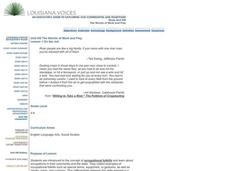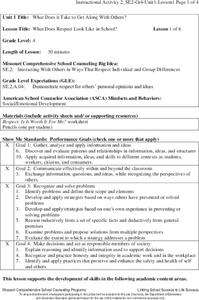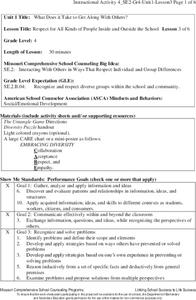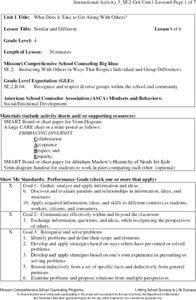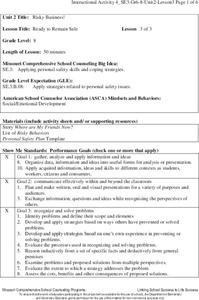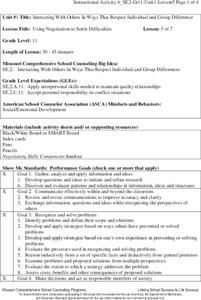Curated OER
Visible Pulse!
Students demonstrate their understanding of Human Body Systems by showing connections between external and internal body structures and how they help humans survive. They use either deductive or inductive reasoning to explain...
Curated OER
"Croak" Science Mystery
Solve the mystery of a declining frog population! Lead your junior ecologists on an investigation that simulates actual events concerning pollution, predation, poaching, and more. Investigators read a story online, then analyze survey...
Curated OER
Family Foodways
Discover, document and share the knowledge of family food and ways special occasions are treated. Your class will explore the context in which food traditions are created and adapted in their families and communities. Each student also...
Utah Education Network (UEN)
It's All Just Similar to Me
Middle schoolers explore the concept of similar figures. In this similar figures lesson, pupils calculate scale factors of similar triangles. They find missing sides of triangles, and measure angles using protractors and measure sides of...
Ohio Department of Education
I Can Name that Angle in One Measure! - Grade Eight
Collaborative groups work with geometry manipulatives to investigate conjectures about angles. They create a graphic organizer to use in summarizing relationships among angles in intersecting, perpendicular and parallel lines cut by a...
Curated OER
The Scientific Revolution in England and Europe
Students read and discuss Scientific Revolution information sheet and the diagram concerning the causes of the Scientific Revolution. They construct a timeline including Aristotle, Democritus, Copernicus, Bacon and Descartes along with a...
Curated OER
On the Job
Young scholars identify the concept of occupational folklife and learn about occupations in their community and the state. Then they collect examples of occupational folklife such as special terms, equipment, or gestures, as well as...
Curated OER
Louisiana Regional Foodways
Students strengthen their research techniques in locating, selecting, and synthesizing information from a variety of texts, media, references and internet resources to study regional food way traditions in Louisiana. They assess the...
Curated OER
Solar Kit Lesson #3 Parts of a Solar Panel - Part I
A solar cell is similar to a rechargeable battery in many ways. Science lab groups connect each in a series circuit to run a mini motor and then compare and contrast them by answering questions and completing a Venn diagram. This is an...
Curated OER
Fiddle Dee Diddle - It's Time For A Riddle
Energize your math class! They will use the story problem process to solve math riddle problems. They compute and solve problems involving addition and subtraction of 3- and 4- digit numbers and basic facts of multiplication and division...
Curated OER
To Give In or Not To Give In -- That Is The Question!
Seventh graders discover how to make the best decisions given the information at hand. In groups, they role-play different roles in scenerios to help them deal with peer pressure. To end the instructional activity, they discuss why it is...
Missouri Department of Elementary
What Does Respect Look Like in School?
What does it mean to be respectful? Scholars complete a self-assessment worksheet to determine just how respectful they are. Next, they choose three items from the survey and write plans for how to improve in those areas.
Missouri Department of Elementary
How We Are Alike And Different
Scholars develop social awareness by exploring the concept of similarities and differences. Learners examine two beverages and use a Venn diagram to identify similarities and differences. They tally each item to identify if they are more...
Curated OER
If It's to Be, It's Up to Me!
Eighth graders discuss the question: How does one become an effective decision-maker or problem solver in social situations? They are given three brief scenarios and after each one students are asked, "What would you do?" Students think...
Curated OER
The Clique
Ninth graders identify and demonstrate the ability to use interpersonal skills needed to maintain quality relationships. Then they identify personal responsibility in conflict situations, while continuing to apply problem-solving and...
Curated OER
Using Negotiation to Settle Difficulties
Eleventh graders explore, analyze and study how to make decisions and act as responsible members of society. They role-play several scenarios of enactments of individuals making choices for resolving conflict while respecting others.
Missouri Department of Elementary
What Does Respect Look Like at Home?
Individuals consider why is it important to respect family members as they complete a self-respect survey to assess their respectful behaviors at home. They then choose three items from the survey and write about how they plan to improve...
Missouri Department of Elementary
Respect for All Kinds of People Inside and Outside the School
Why is it important to embrace diversity? Scholars explore the topic by learning about the CARE acronym: Collaboration, Acceptance, Respect, Empathy. They also complete a diversity puzzle worksheet and play a collaborative game that...
Missouri Department of Elementary
Similar and Different
Using a Venn diagram, pupils compare the similarities and differences between two classmates. Next, they review the CARE acronym (Collaboration, Acceptance, Respect, Empathy) and discuss how it applies to diversity in the classroom.
Missouri Department of Elementary
Talk it Over and Work It Out: Compromise!
Stop, Think, Act, Review! Scholars use the STAR method to role play two conflict resolution scenarios about childhood problems such as jealousy or cheating. Then, the larger group judges each case to determine if the compromise is a...
Missouri Department of Elementary
Putting on Armor
Peers can exert tremendous pressure that can lead to positive and negative consequences. To conclude the Risky Business unit, class members create a Personal Safety Plan. They list things or situations that cause stress, things they have...
Missouri Department of Elementary
Life … Bring It On!
To conclude the study of coping skills, class members create a collage that identifies and celebrates their strengths that support their ability to make good decisions.
Missouri Department of Elementary
Managing Conflicts
Conflicts happen. Learning how to manage conflicts in mature and positive ways is an important part of social-emotion growth. The instructional activity offers insight into behaviors that exacerbate conflicts as well as suggestions for...
Missouri Department of Elementary
Using Negotiation to Settle Difficulties
Negotiating can be a win/win experience if the involved parties apply the skills and techniques offered in a lesson plan about negotiating to settle differences.








